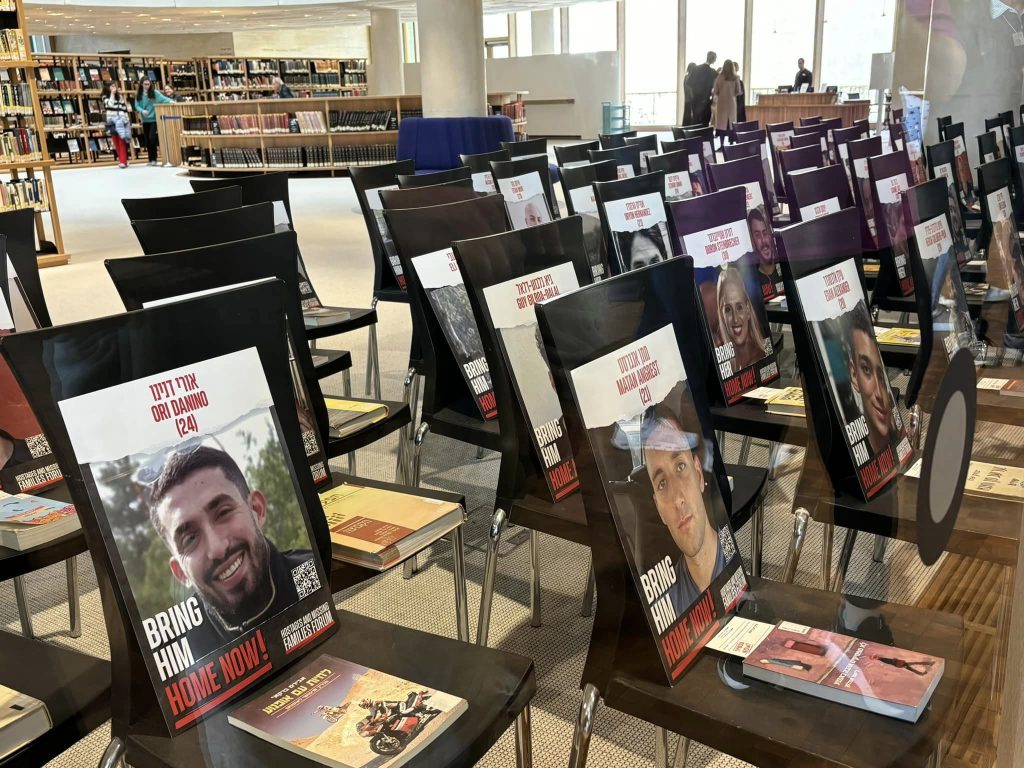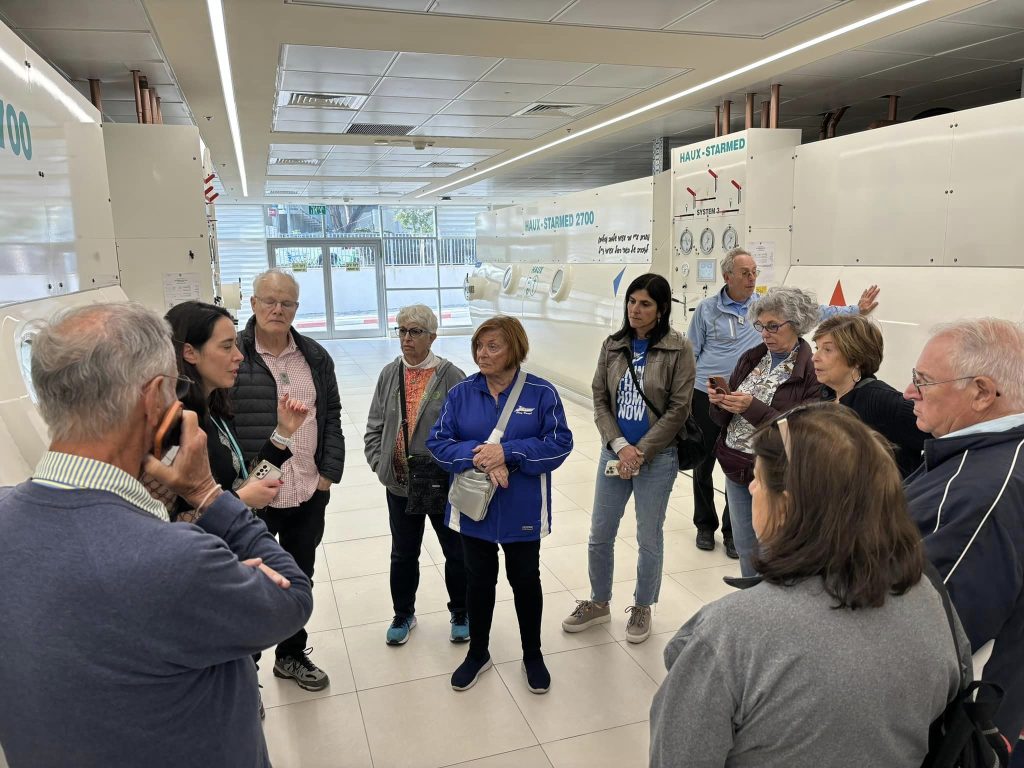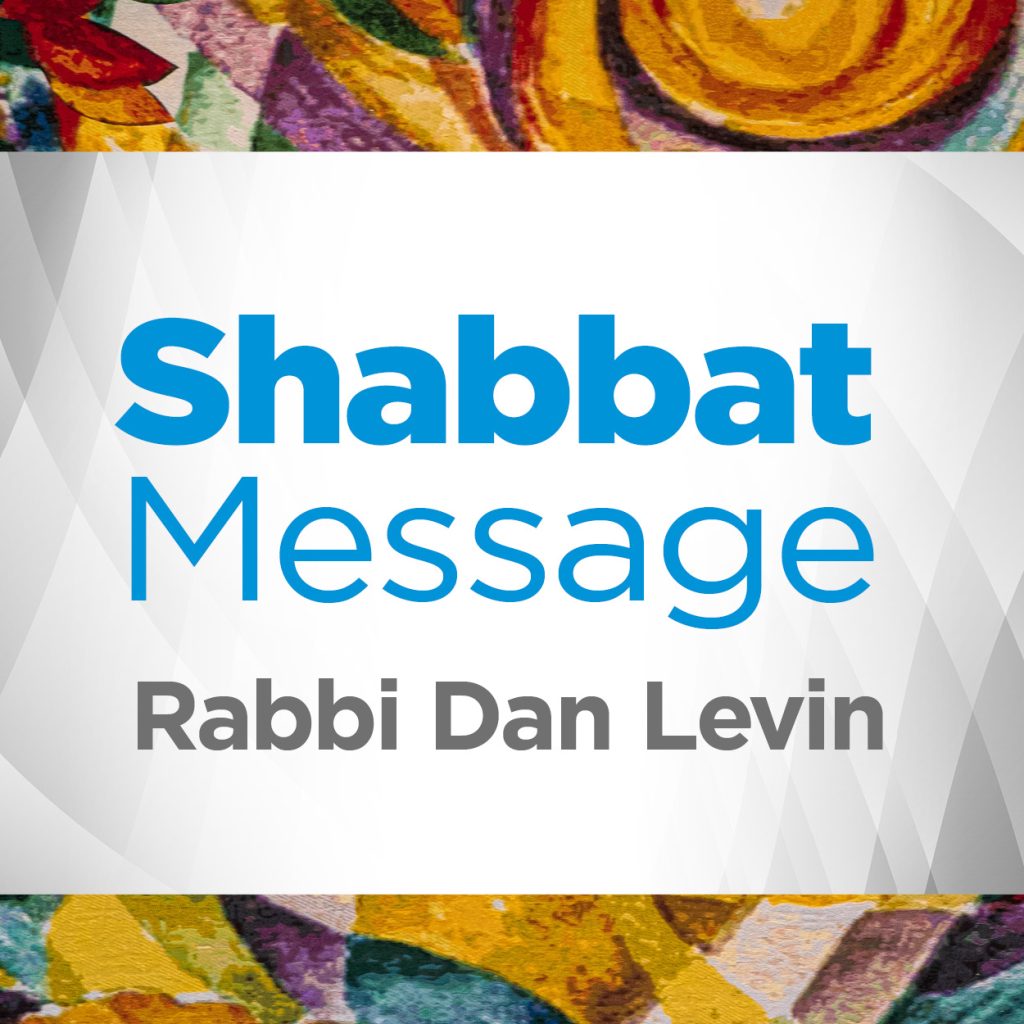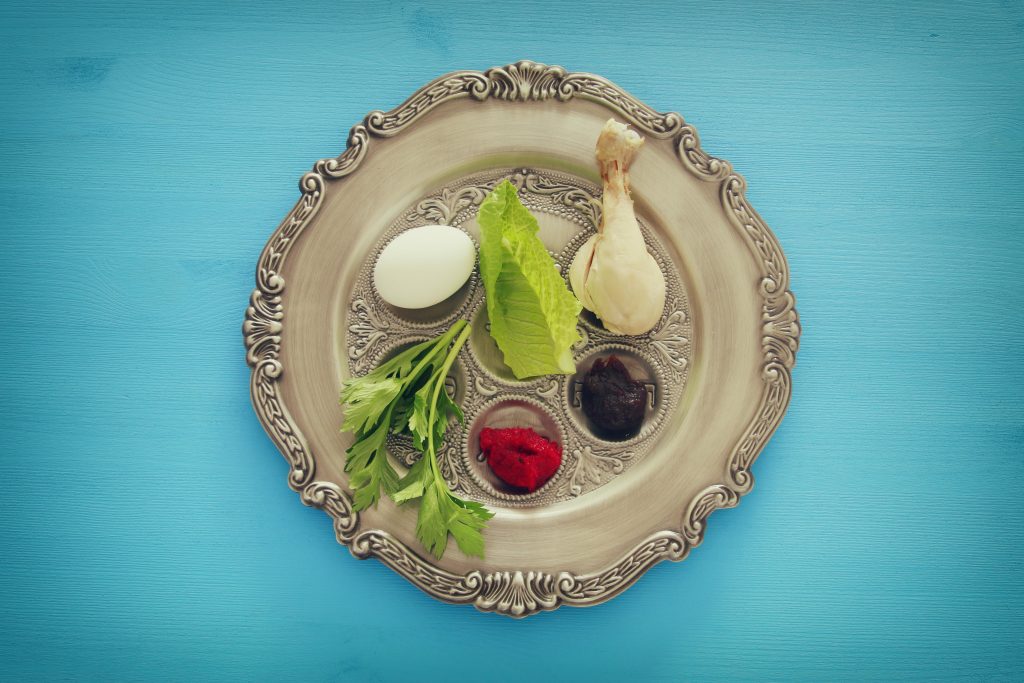While on our temple’s Solidarity Mission to Israel from February 18-23 2024, Rabbi Dan Levin summarized each day on social media. Here are his day-by-day posts.
Day 1 - February 19, 2024
What brings us to Israel? A duty, a compulsion, a sense of deep connection, a yearning to share love, to offer support, to bear witness, to give a hug. It is truly for us to feel, as one member of our group shared, that in this most consequential moment, we did not stand idly by while our people were bleeding.
We arrived this morning to an empty Ben Gurion Airport. It seemed as if our flight from Miami was the only flight at the airport. Descending the famous ramp to Passport Control, one is greeted by the missing – the infamous posters of the hostages reminding us of the national tragedy into which we had landed.
To begin the day, we went to Latrun – the site of the most devastating and costly battle in Israeli history, that is before October 7. We were reminded that what was true in ancient days is true today, that one must carefully guard against attacks and secure the artery feeding Jerusalem.
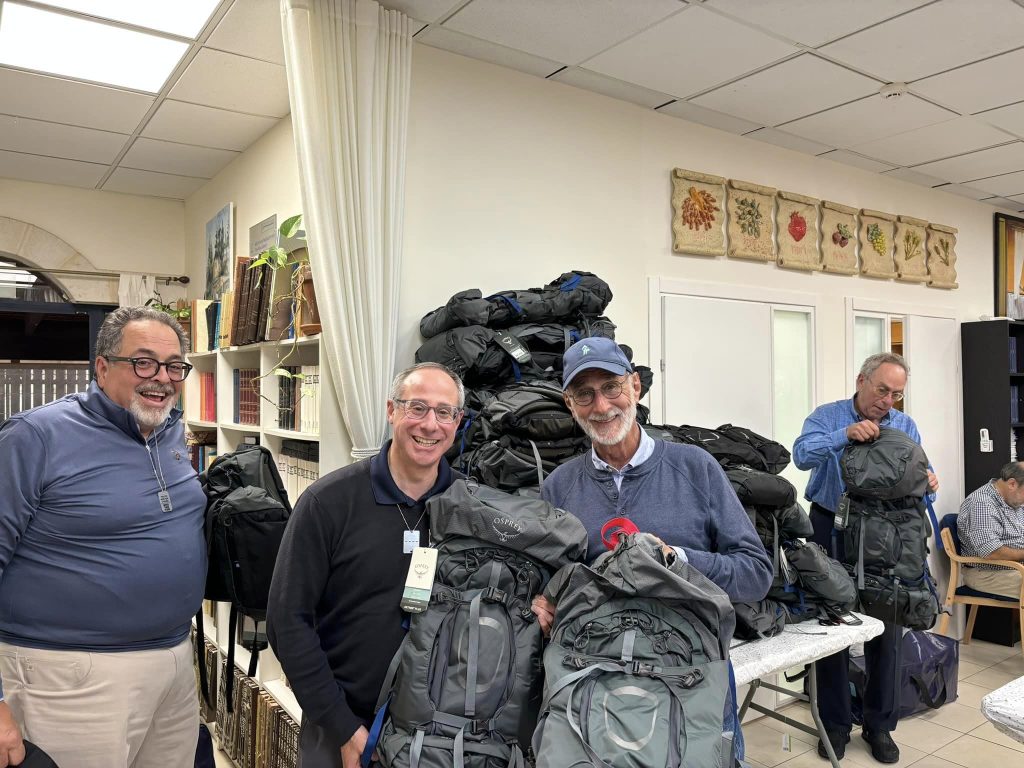 Next we ventured to Kehilat YOZMA, our sister congregation in Modiin. We unloaded the ten duffles filled with Osprey Backpacks, and with our friends from YOZMA, filled 50 backpacks with supplies to support soldiers – everything from new underwear to Tshirts and socks, to toiletries and other supplies to make life easier. We pray that the soldiers who will be given these packs will soon be home from war, and can use them to travel to recover from their service. They are, as Rabbi Barkin said, Israel’s greatest generation. We are so proud that our congregation came together to make this project such a success. We listened with respect as a member of the congregation spoke of the anguish in seeing his beautiful youngest son suffer horrible injuries. We listened with compassion as a mother shared her anguish and worry with her son serving on the front lines for months. Still, they both are grateful that their children are still alive.
Next we ventured to Kehilat YOZMA, our sister congregation in Modiin. We unloaded the ten duffles filled with Osprey Backpacks, and with our friends from YOZMA, filled 50 backpacks with supplies to support soldiers – everything from new underwear to Tshirts and socks, to toiletries and other supplies to make life easier. We pray that the soldiers who will be given these packs will soon be home from war, and can use them to travel to recover from their service. They are, as Rabbi Barkin said, Israel’s greatest generation. We are so proud that our congregation came together to make this project such a success. We listened with respect as a member of the congregation spoke of the anguish in seeing his beautiful youngest son suffer horrible injuries. We listened with compassion as a mother shared her anguish and worry with her son serving on the front lines for months. Still, they both are grateful that their children are still alive.Following our visit to YOZMA, we visited the National Military Cemetery in Modiin to pay respects to the young soldiers who gave their lives on October 7 and since to defend the State of Israel. It is soul crushing to see the freshly engraved “bedstones” for the young people so recently and tragically laid to rest.
We then came up to Jerusalem – to which our people has turned in prayer every day for millennia, and gave thanks for the blessings of and privilege of our journey.
Everywhere we go, and with everyone we meet, the same greeting is shared: “Thank you for being here. It means so much that you have come to show support.” Truly the privilege is ours.
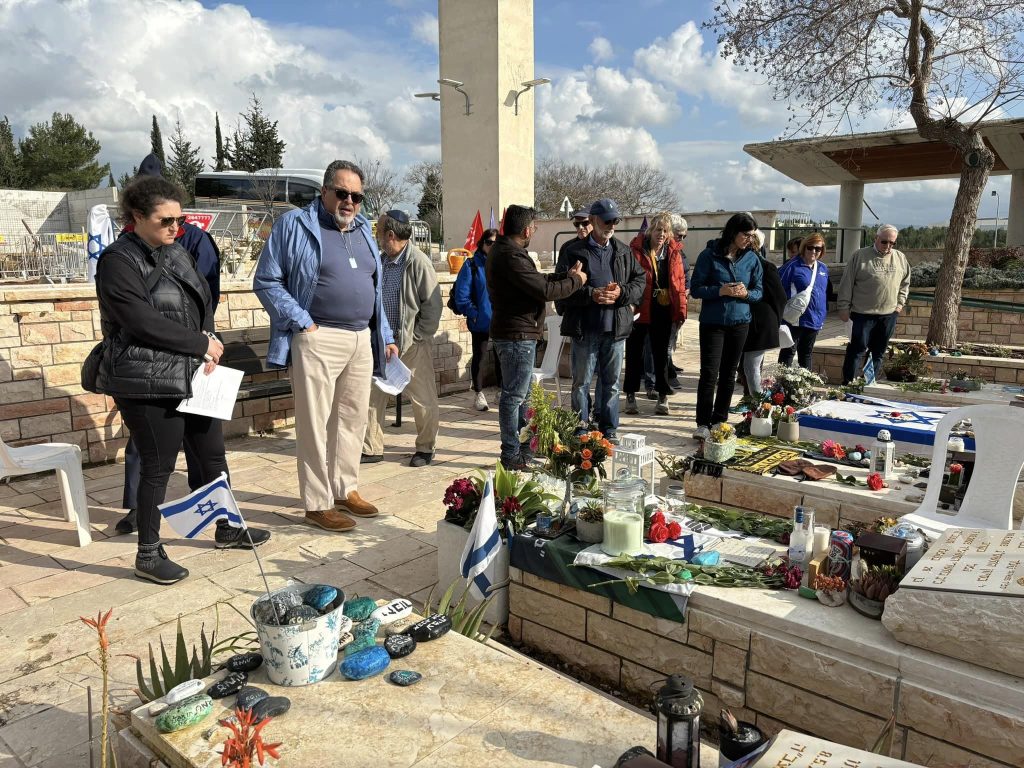
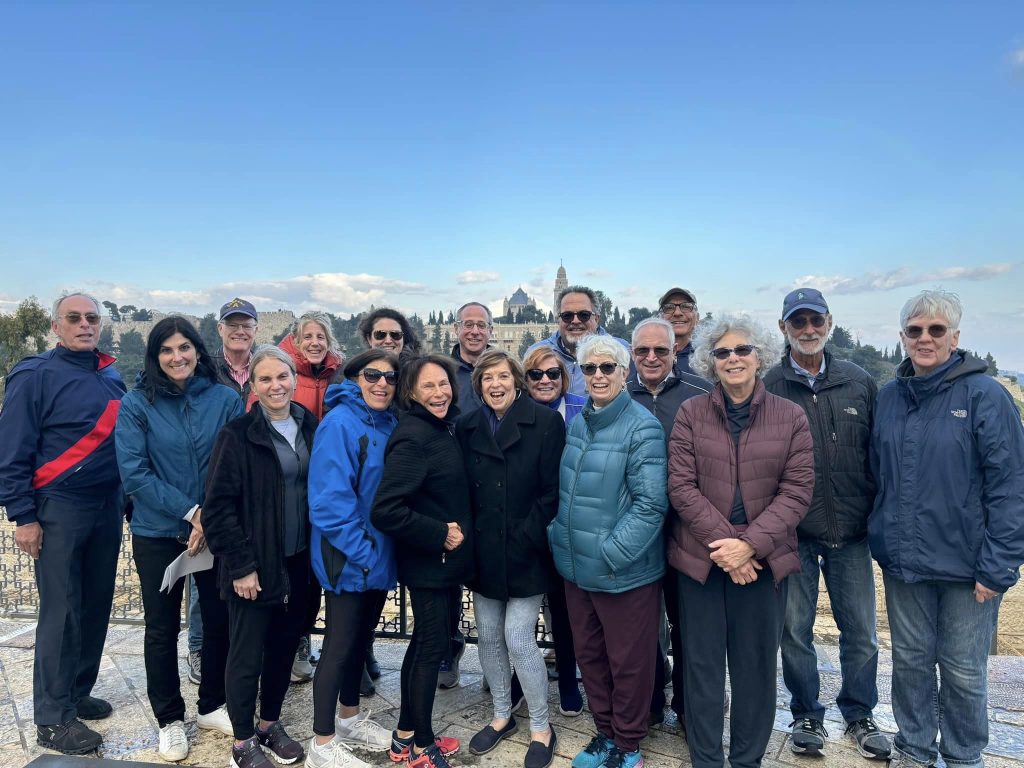
Day 2 - February 20, 2024
It’s hard to describe what it means to visit a place where evil was once realized. The sun shines. It is quiet. But it is not peaceful. It is not serene. There is a lingering sense of dread. You can almost hear the screams echo in the silence. You can feel the sadness. You can taste the bitterness.
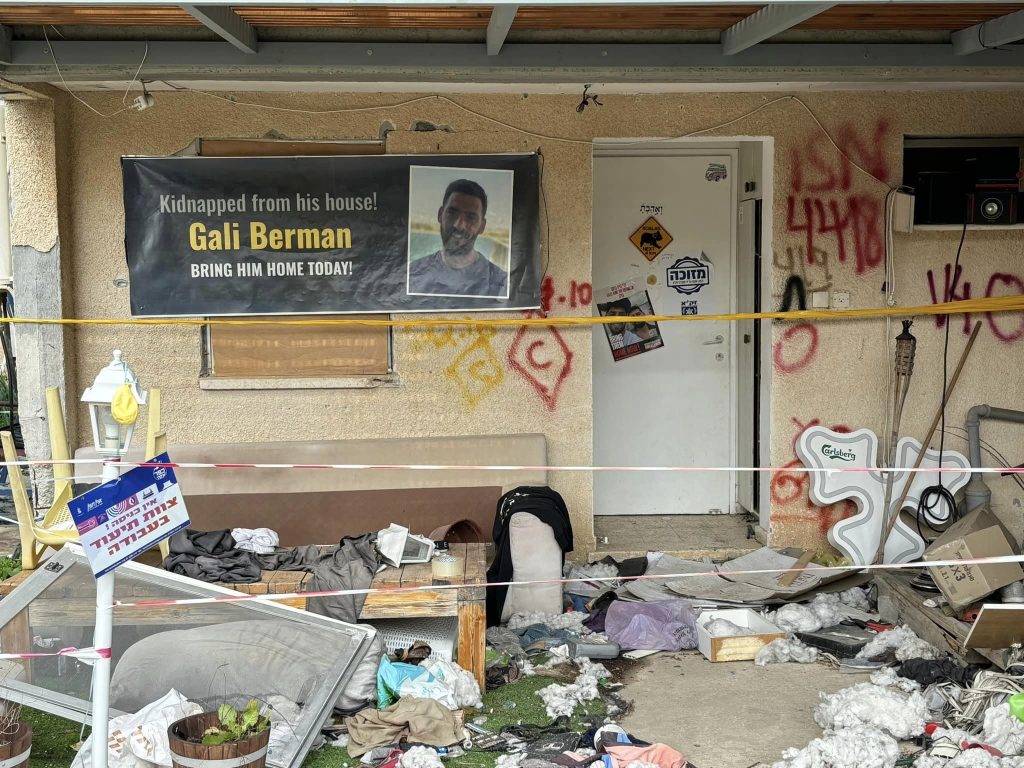 To visit the sites of mass-murder in the communities in the south of Israel is at once a pilgrimage and a shiva call. You need to see it. You need to feel it. But those who live there need you too. They need to know that you know the awful they know. They need to know you feel the awful they feel. There is something holy simply in presence – in being present, in bearing witness, in listening to what is said, to what is not said, to simply offering an embrace.
To visit the sites of mass-murder in the communities in the south of Israel is at once a pilgrimage and a shiva call. You need to see it. You need to feel it. But those who live there need you too. They need to know that you know the awful they know. They need to know you feel the awful they feel. There is something holy simply in presence – in being present, in bearing witness, in listening to what is said, to what is not said, to simply offering an embrace.Visiting Kfar Aza today was surreal. I had the honor of visiting this remarkable community in 2021 with a group of rabbinic colleagues following the attacks by Hamas in May of that year. We spent the day with Amlas Chen Abrahams Kotler, who showed us the “souvenirs” from rocket attacks that littered her yard, the incendiary balloons launched to set fire to the fields. We met Ofir Libstein z”l, Head of the Sha’ar HaNegev Regional Council, who believed so deeply in coexistence with his Gazan neighbors. He shared his dream of building an industrial zone that would enable up to 10,000 Gazans to work in Israel every day, improving their lives while growing opportunities in the region.
Someone had asked, “why would anyone live here with the threat of all the rockets?“ Chen replied, “Why wouldn’t we live here? This is the greatest place. Our children can run and play, they grow up surrounded with love. If not for the rockets, this would be paradise.”
Today, visiting with Chen three years later, everything has changed. Courageously, she led us through the Kibbutz. The manicured lawns and gardens were overgrown, houses bore the scars and burns of the attack, an empty sukkah still stands – no one remains to welcome guests. I couldn’t help but notice Chen catch herself: “In this house, my friend lives – I mean lived …” She had to live in the past and the present simultaneously. Each step is a memory of her growing up in the kibbutz that raised her, a memory of what she had, of what she lost, of what she has.
This ritual of bringing us through this desecrated sacred space – her home that was violated in so many ways has grown familiar. Signs attest to who once lived in a home, who was murdered or kidnapped from that place. Ritual creates normalcy when the normal is so abnormal.
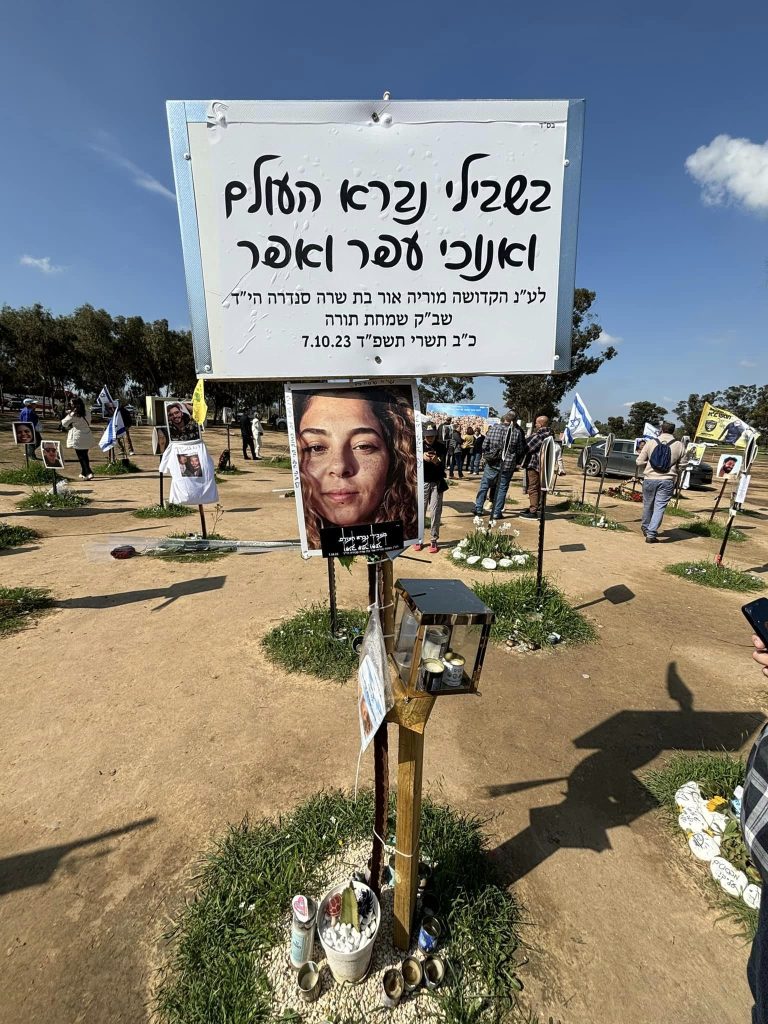
We visited the site of the Supernova Dance Festival. In the fields of Re’im, where thousands gathered to celebrate the end of the holy days with music and dance and love, 364 people were brutally murdered, dozens kidnapped, and others raped and butchered in a frenzy of evil. Today makeshift memorials attest to the young lives lost, their lost smiles from hanging photographs tear at the heart. A man takes a violin next to one memorial sign and begins to play. A group of visitors gathers – men and women, old and young, orthodox, reform, and Druze. Together all sing mournful yearning prayers – “Lu Y’hi – Maybe one day it will be”. Together we pray for the release of the hostages. Together we recite Kaddish for the lost. JNF has planted trees for each of the victims, a living and growing memorial to the lives the at will no longer live and grow.
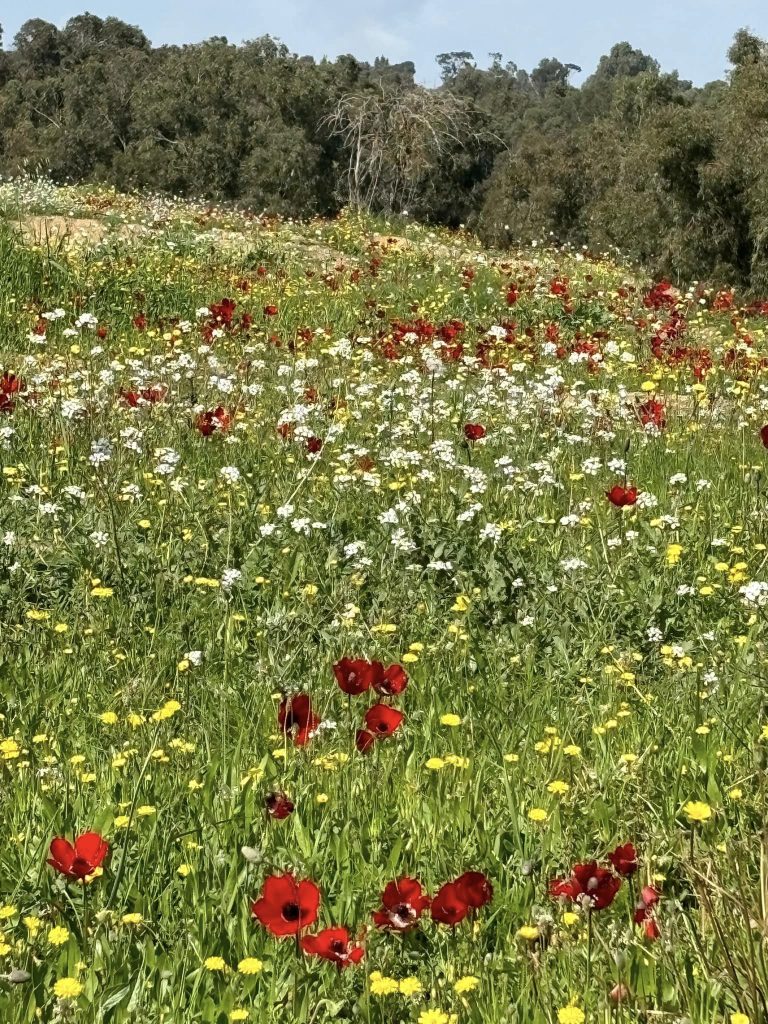 And there, in the field, the wildflowers bloom. The birds have begun to return. Death recedes and memory takes root.
And there, in the field, the wildflowers bloom. The birds have begun to return. Death recedes and memory takes root.To end the day, we gathered with Karen and her husband who have transformed their organic farm into a place of refuge and resupply for tired and weary soldiers. Every day they bake hundreds of pizza pies, while others prepare BBQ for hungry soldiers. Their warehouse carries needed supplies to help support and sustain those risking their lives to defend the State of Israel. A commander of a visiting platoon had brought his soldiers for a respite. They have endured so much. They have lost three of their team, and another severely injured. They are tired and yet still resolute. He offered his thanks for our help in preparing pizza, proving hot BBQ and fresh salad – but mostly just for being there, for showing our love and support, for letting his team of men and women know how grateful we are for their sacrifice.
With each encounter, we parted with an embrace – a long and tight embrace – which said though I leave you we are here. We may depart, but our presence will remain. And we take you with us, your pain and anguish, your determination and sacrifice. The echo of love shared.
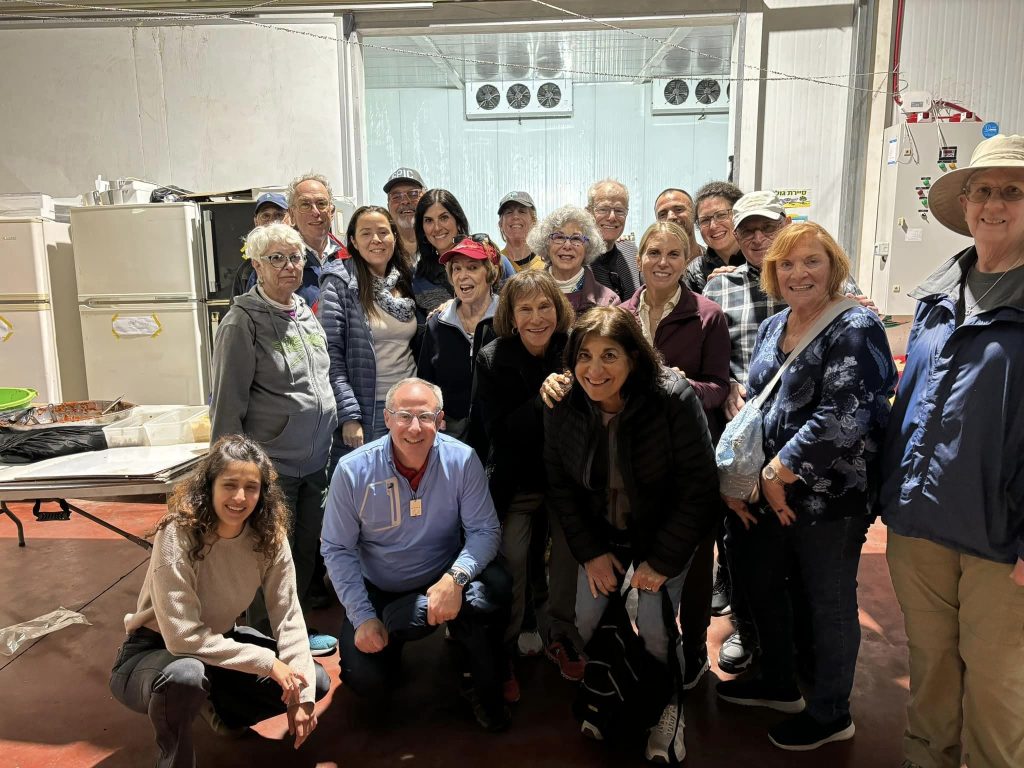
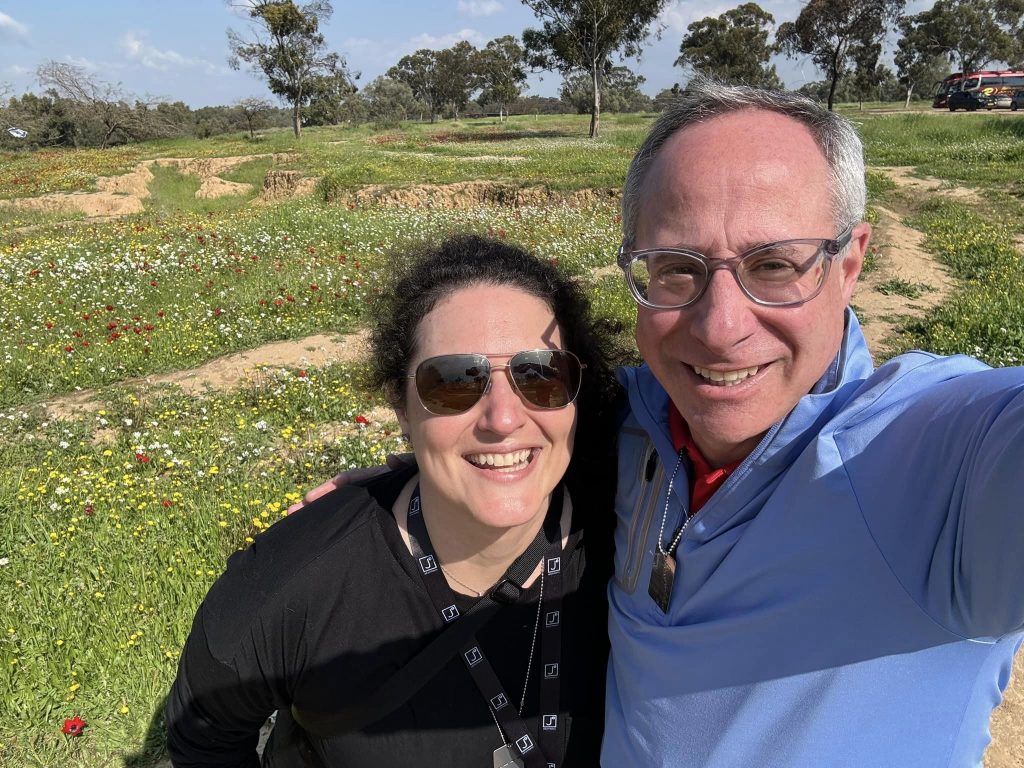
Day 3 - February 21, 2024
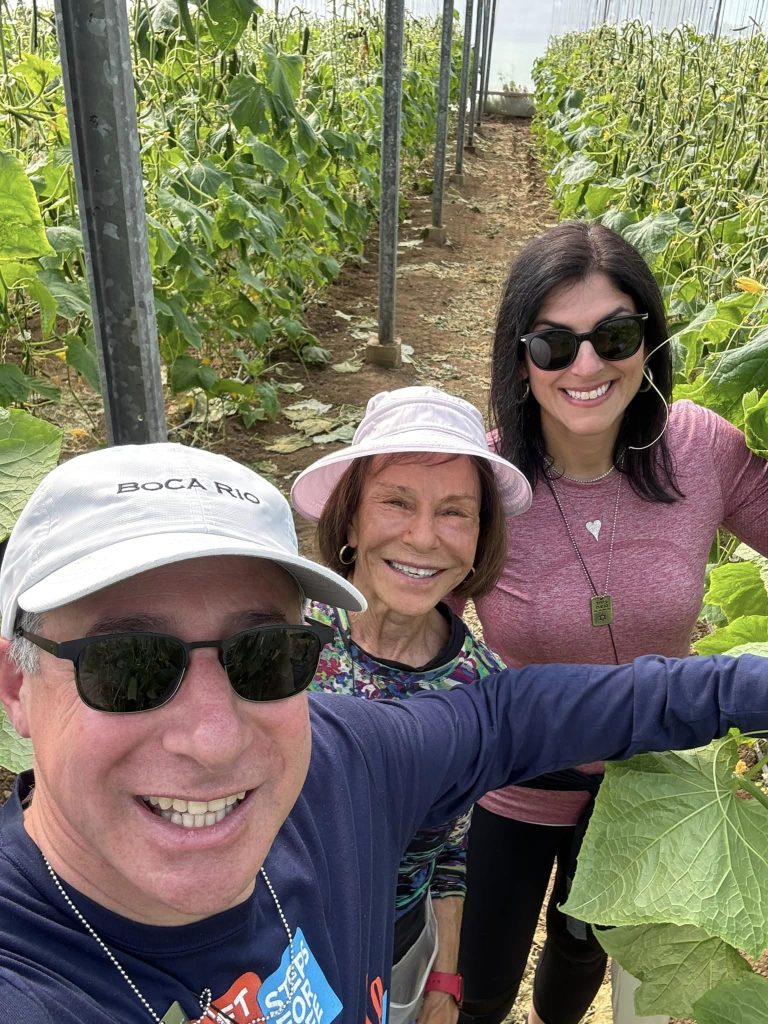
A well-known early Zionist song includes the following lyric: “Anu Olim Artza Livnot U-L’Hibanot Bah – We are going up to the land” Livnot, “to build” but also L’Hibanot Bah, “to be rebuilt by it.”
To build and be rebuilt – this reflexive synthesis is what we sought in coming to Israel.
We wanted to contribute – to help build and rebuild what was broken by this attack and the ensuing war. We contributed our resources with backpacks and donations collected by generous supporters. But we also came to contribute our time and to work.
Since October 7, so much of Israel’s agricultural industry was decimated. So many of those who worked in agriculture have left to serve in the army. Others, including many Thai guest workers, chose to return home. And so the country had responded with legions of volunteers.
We journeyed to a farm near Ashdod. In the process building, a group of high school teens were busy packing vegetables and singing pop songs. We jumped in the jeeps and headed out to the hothouse, where we spent the morning tending to the hanging cucumber vines. Row after row, we lifted the vines from the ground with the tenderness of child. It was great to watch the sprouting cucumbers grow, a sense of hope and nourishment for the hungry souls and salads of Israel.
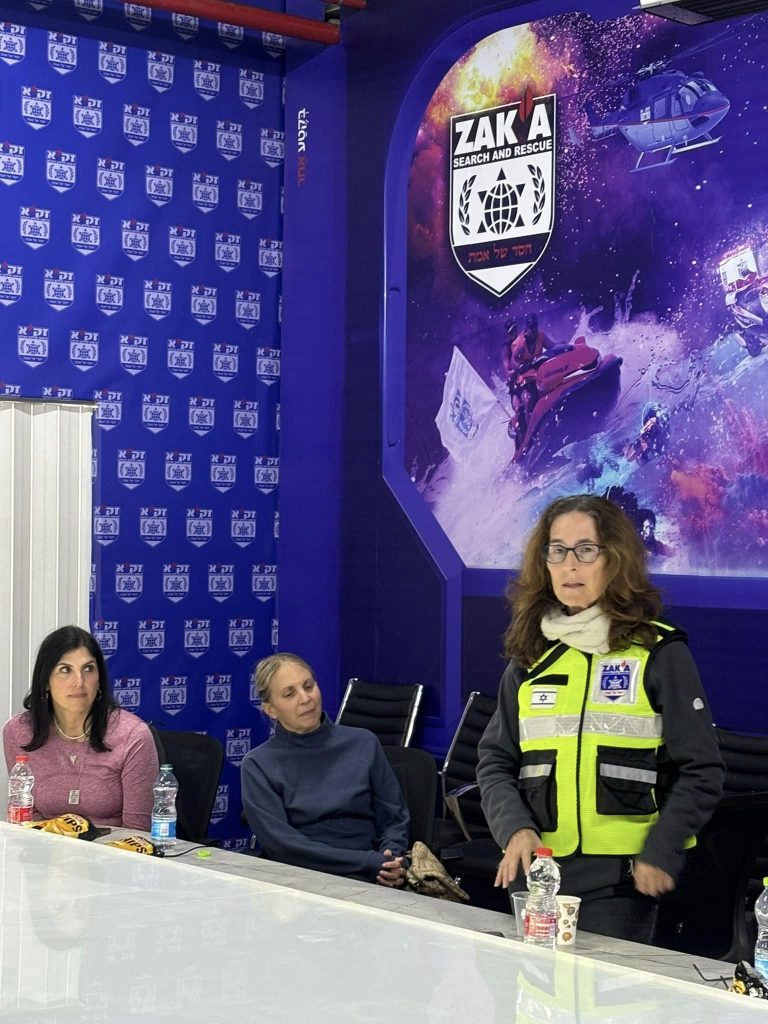 Next we met with ZAKA – the volunteer rescue service that ensures that human remains are carried with dignity and honor in strict accordance with Jewish law. On October 7 and in the days to follow, ZAKA volunteers took upon themselves the grisly and heart wrenching work of caring for the hundreds and hundreds of victims of the massacre. As difficult as it was to hear the stories of those who had the grim task of retrieving the burnt bodies of children, who had to tend to the blood-stained bunkbeds and cribs, it was crucial that we listen with respect to those who carried out unthinkable duties with broken hearts and crushed souls. It is their solemn vow to restore humanity in the face of the greatest inhumanity.
Next we met with ZAKA – the volunteer rescue service that ensures that human remains are carried with dignity and honor in strict accordance with Jewish law. On October 7 and in the days to follow, ZAKA volunteers took upon themselves the grisly and heart wrenching work of caring for the hundreds and hundreds of victims of the massacre. As difficult as it was to hear the stories of those who had the grim task of retrieving the burnt bodies of children, who had to tend to the blood-stained bunkbeds and cribs, it was crucial that we listen with respect to those who carried out unthinkable duties with broken hearts and crushed souls. It is their solemn vow to restore humanity in the face of the greatest inhumanity.We came up to Jerusalem and made our way to the Kotel. The plaza was filled with soldiers and families who were to be sworn into their service in the infantry. We made our way to the wall to offer our individual prayers – for ourselves, for family, and for our people.
Over dinner, we had the privilege of sharing time with Rabbi Sergio Bergman of the World Union for Progressive Judaism, and Orly Erez Likhovski, Director of the Israel Religious Action Center. Orly shared the remarkable work IRAC engages every day to make the State of Israel stay true to its values of equality and to fight back against racism, gender discrimination, religious intolerance, and a more just society. Their work was in the forefront of efforts to push back against the anti democratic judicial reforms proposed last year, and continues to make a difference as Israel’s wartime society takes root.
It was inspiring to see those doing so much to build and rebuild the State of Israel, and an honor to join with them. But truth be told, it is us who feel some sense of being rebuilt, who found today a pathway that helps to rebuild our shattered hearts and to bring healing to our wounded souls.
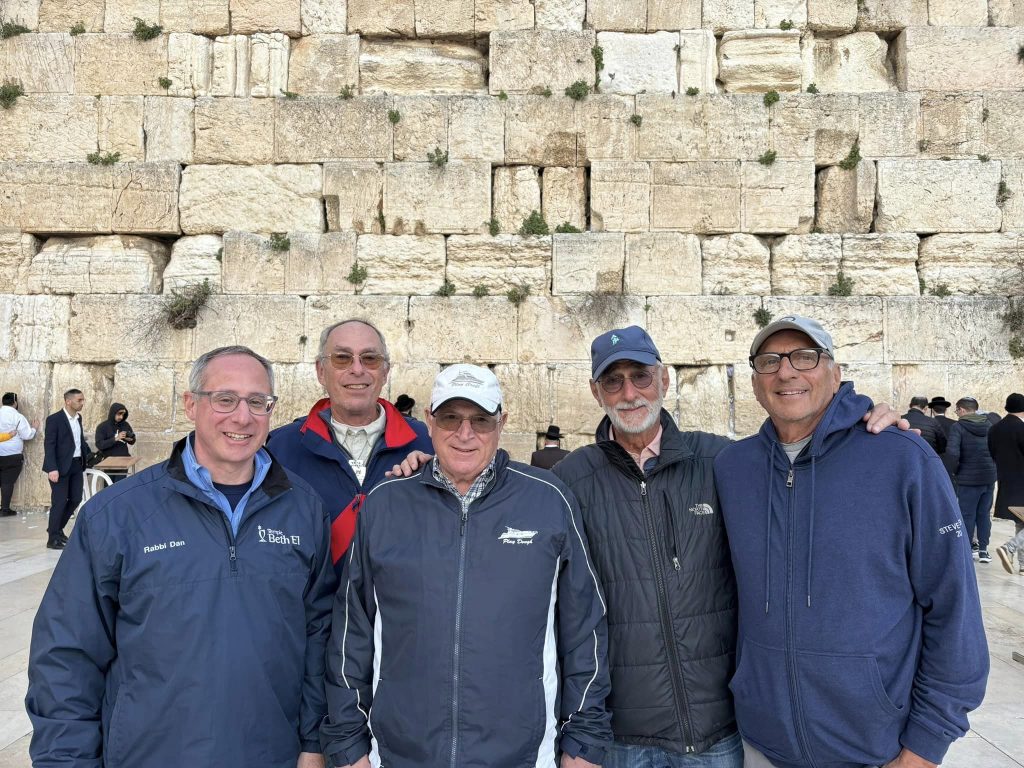
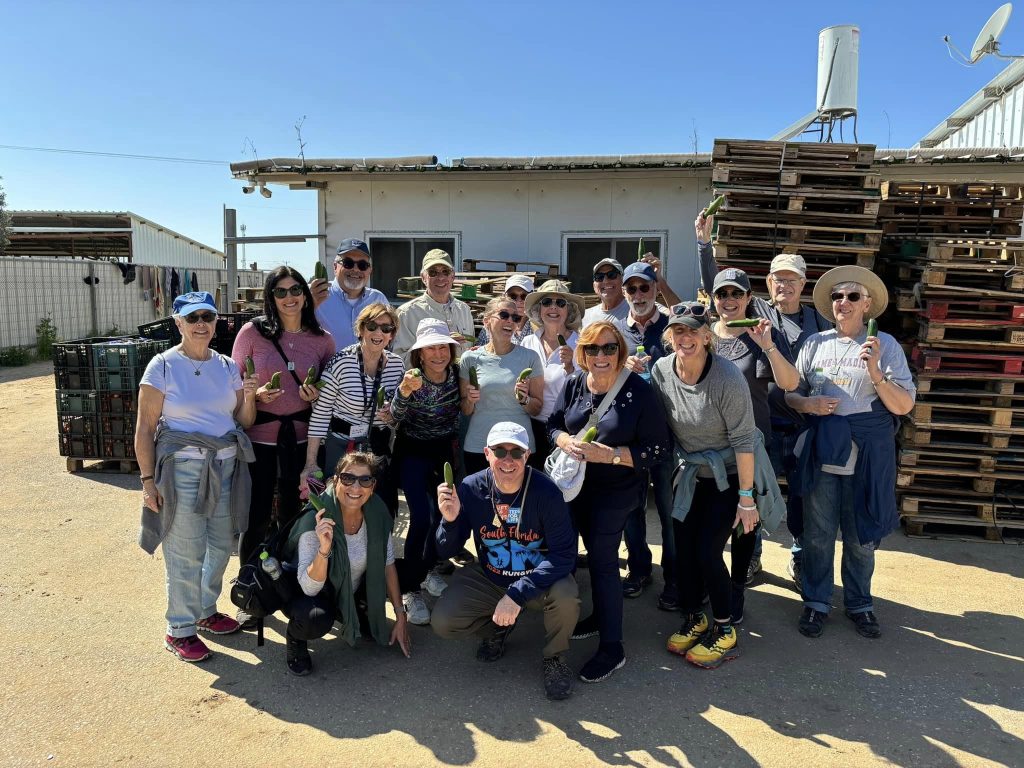
Day 4 - February 22, 2024
Years ago, a mentor of mine taught me the importance of presence. When someone is suffering, our job is not to pull that person to the next step or push them to the next step, or even to tell them which way to go. It is simply this: to say that as you take this next step in your life, or choose not to take a step, that we are here to hold your hand and walk with you.
To visit Israel today is to offer the gift of presence – certainly to offer our hands to help and volunteer, but also simply to offer a hand to hold, to offer the warmth of a loving embrace.
Starting the day with Prof. Reuben Hazzan of Hebrew University, we gained clarity on just how unclear is the moment, and how the State of Israel might move through the current torrent of crises.
Then we visited Israel’s new National Library. We remaked on what it says about our culture that at this juncture in history we sought to build a library, a repository for the treasure trove of our literary history, for we are a people who understand in our DNA the spiritual power of a word, the holiness embedded in a text.
An empty audience of seats bears the name of each hostage that still languishes in captivity, and on each seat is a book the family suggests that individual would want to have with them. In each book is a check-out card marked “overdue”. Would that more hostages come home and visit the library to return their books.
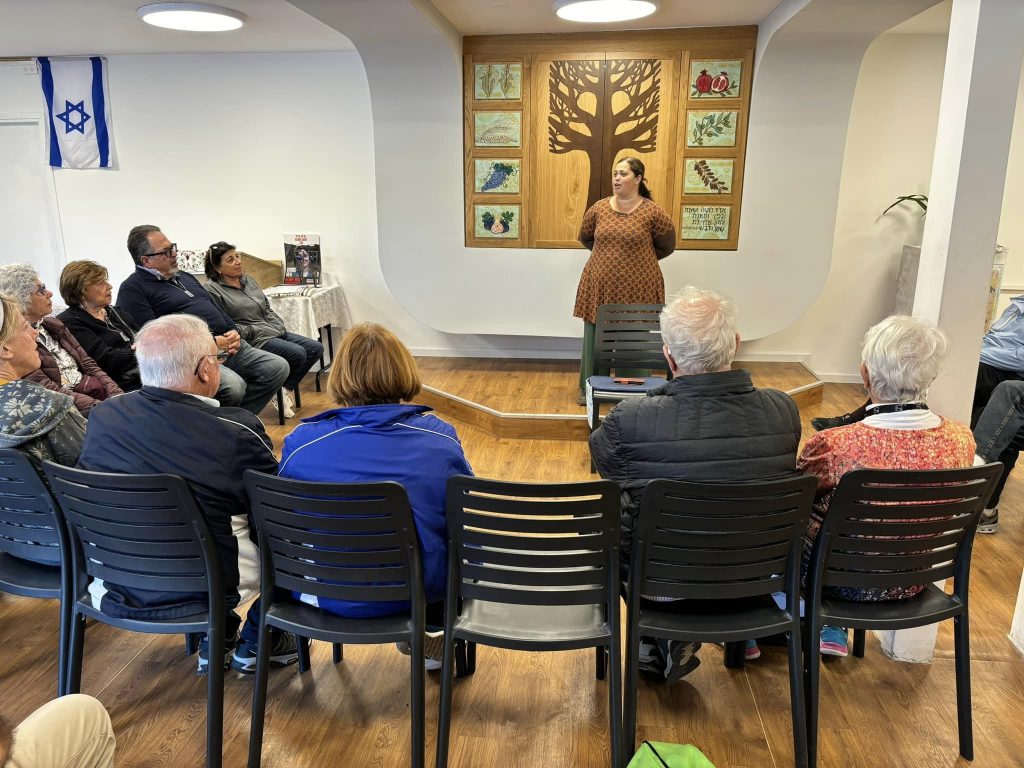 Then to meet Rabbi Rinay Safaria Shwartz, who leads V’AHAVTA – the Reform congregation in Shoham. We could feel the energy and spirit in this small and growing community as together we baked cakes and prepared vegetable platters for soldiers to enjoy on Shabbat – to offer some measure of home comfort while they serve in such dark and difficult circumstances.
Then to meet Rabbi Rinay Safaria Shwartz, who leads V’AHAVTA – the Reform congregation in Shoham. We could feel the energy and spirit in this small and growing community as together we baked cakes and prepared vegetable platters for soldiers to enjoy on Shabbat – to offer some measure of home comfort while they serve in such dark and difficult circumstances.Later we visited the Sagol Center for Hyperbaric Medicine and Research. Dr. Keren Doenyas-Barak’s extraordinary research with Hyperbaric therapies for people suffering from PTSD and stroke has transformed the lives of people who have suffered catastrophic physical and mental injuries. It was inspiring to learn how yet again Israeli ingenuity is making such a difference in advancing medical breakthroughs.
Finally to the Tel Aviv Art Museum, which now hosts “hostage square”. New art displays are scattered around the plaza, along with tents where families can gather to find support as they await the return of their loved ones.
We visited the offices and workspace of the Hostage Families Forum – donated by Checkpoint. The operation has grown in sophistication. Volunteers work constantly to advocate and support the families, and to work PR and media to keep the hostages constantly in the world’s consciousness.
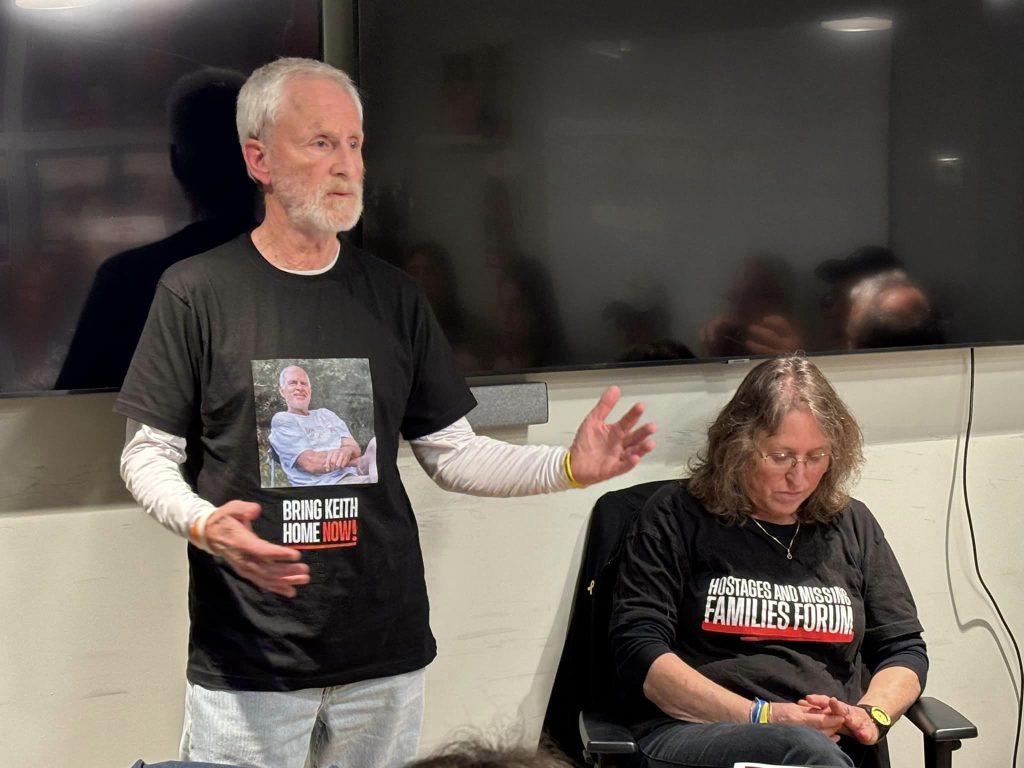 We met Lee Siegel and his sister-in-law Sheli. Lee’s brother Keith and his wife Aviva were kidnapped from Kfar Aza. They were held together until Aviva was released in the fourth wave of returned hostages. Keith, however, remains in captivity. Lee shared his brother’s story, how after growing up in Chapel Hill, NC Keith followed him on Aliyah and met his wife Aviva on their kibbutz, choosing to make his home at Kfar Aza. He loved clean living and meditation, and treasured his children and young grandchildren. Lee, like so many hostage families, believes that the most important priority for Israel now should be to get the hostages home. The burden of his worry for his brother weighs heavily on his shoulders. We prayed together for his brother’s safety and that he should be home with his family – now, without delay.
We met Lee Siegel and his sister-in-law Sheli. Lee’s brother Keith and his wife Aviva were kidnapped from Kfar Aza. They were held together until Aviva was released in the fourth wave of returned hostages. Keith, however, remains in captivity. Lee shared his brother’s story, how after growing up in Chapel Hill, NC Keith followed him on Aliyah and met his wife Aviva on their kibbutz, choosing to make his home at Kfar Aza. He loved clean living and meditation, and treasured his children and young grandchildren. Lee, like so many hostage families, believes that the most important priority for Israel now should be to get the hostages home. The burden of his worry for his brother weighs heavily on his shoulders. We prayed together for his brother’s safety and that he should be home with his family – now, without delay.After dinner, walking along Nahalat Binyamin in Tel Aviv, the cafes and bars and restaurants were full again – young people embracing life and each other, insisting on moving forward with life and even joy.
And so our visit concludes with embrace – with whatever healing our presence can offer, and with prayers that soon the grief and trauma will recede and peace and healing will follow.
Shabbat Shalom.
